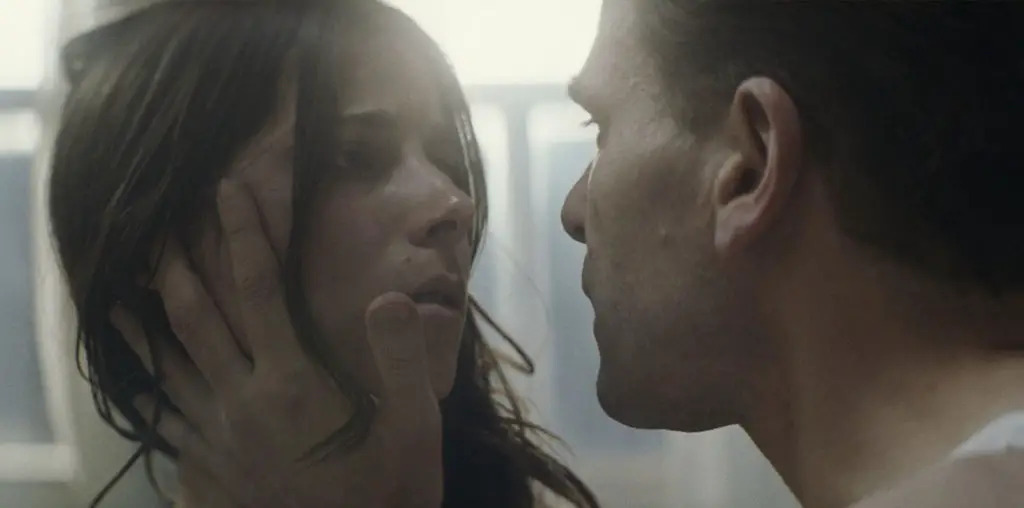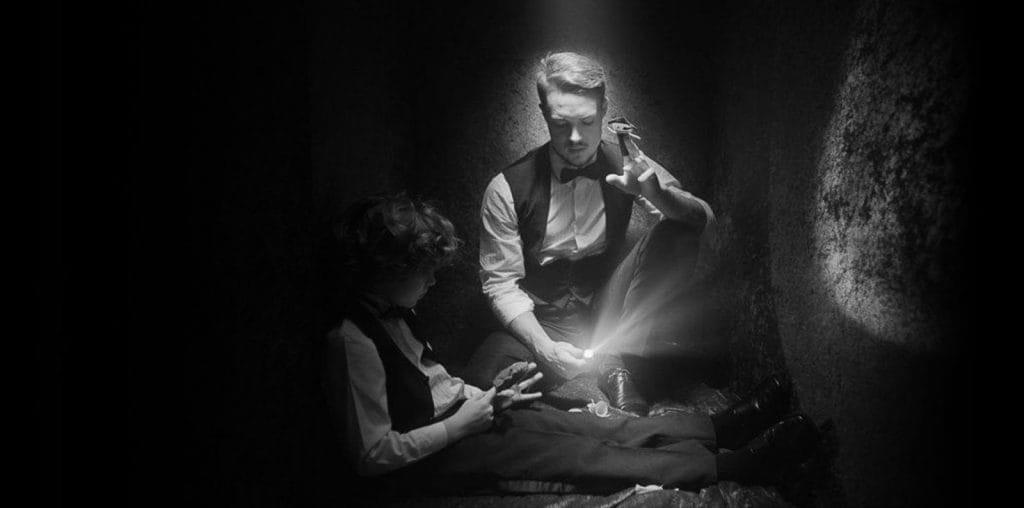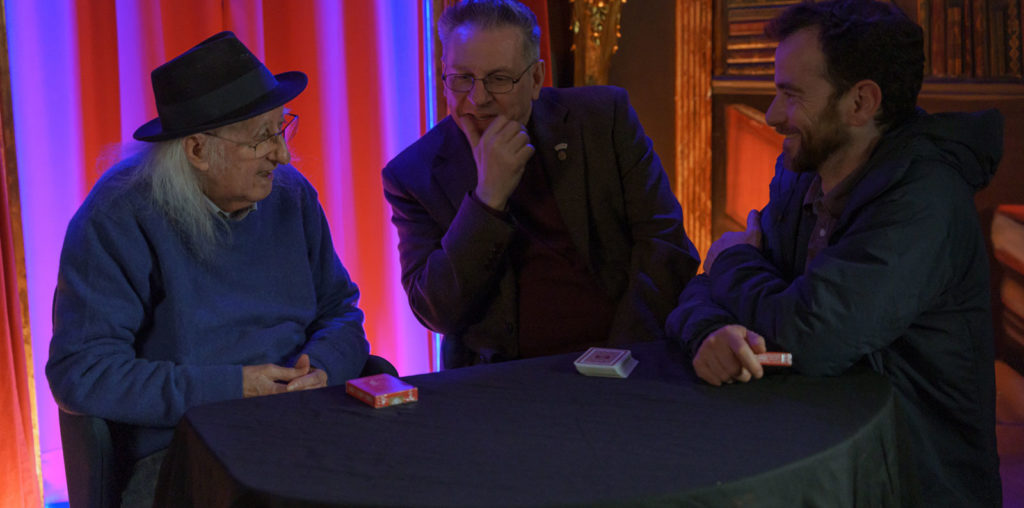
[ THE SCOOP: ] ^ Gay romantic comedy. A naive young poet in search of literary inspiration and life experiences gets both when he falls in love with a charismatic-but-commitment-averse older man. (Directed by David DeCoteau.)
[ BUDGET, SCHEDULE, STATUS: ] ^ $66,000 total, raised primarily through private investors. Starting in 1993, David and Jerry provided the story outline and development notes in weekly meetings with Rondo, who finished the script in 1994. They found investors in the summer of 1996, and that October shot for 10 days in the Los Angeles area. Post production took until the end of March 1997. So far the film has screened, with very good reviews, at the Turin Gay and Lesbian International Film Festival, the New York Gay & Lesbian Film Festival, the San Francisco International Lesbian and Gay Film Festival, and Outfest LA.
[ WHY DID YOU MAKE IT? ] ^ David was already an established and experienced feature director, but after doing numerous straight-to-video and cable projects he wanted to direct a movie about gay life in which no one had AIDS, no one came out, and no one committed suicide. David and Jerry found Rondo– who until then had written primarily as a poet, journalist, and activist– through an artists’ networking organization, and hired him to write the script. Which was great for Rondo, since it was essentially his own life story that he wound up telling, which he says he never would have done otherwise.
[ WHAT WAS YOUR EXPERIENCE MAKING THE FILM? ] ^ [ Jerry: ] ^ We went through casting directors and Dramalogue to find the actors, and we were able to use gay-friendly locales in Silver Lake and West Hollywood as shooting locations; and also a friend’s house in the Hollywood Hills for the pool party scenes. The shoot itself went without any problems. Our DP, Howard Wexler, had his own camera and this mini-van full of equipment– and he would do these ten-minute lighting setups [among average mortal DPs, an ordinary setup– getting the lighting and camera angles worked out for a given shot– can take from 30 minutes to 2 hours]. It took us ten days to shoot the entire film. ^
[ Rondo: ] ^ One of the best things for me was actually being on the set during filming, because I saw that a lot of the changes that took place in the script had nothing to do with my writing per se, but for instance you might have a line that was supposed to be said on the way from the counter to the table, but we might be in a such a small room that the actors couldn’t say all those words in that amount of time. I have a lot more respect for actors now. I had respect for them before, but it’s different to actually be on set from 7 at night til 2 in the morning, and just see all the stuff that happens– especially in an independent film, where you can’t kick the owner of the location out and so everyone’s discussing what’s going on in the scene. And to be an extra in the film– I think every writer should be an extra in their own film; it’ll help them for the next thing they write. If you’re in a position to be as active in the production as I was, you’ll be prepared for how your script changes on the way to the theater. I was involved with the process of change, and I think that was much easier on me and my ego than if I’d just sat down in the theater to watch the finished film and said Oh my god, what happened? And things happen in the editing. Things I would agree with, and things I didn’t agree with, but at least I got to see what went into it. Knowing that was helpful, and it helped me feel more a part of it. ^
[ WHAT SACRIFICES DID YOU MAKE ALONG THE WAY? ] ^ [ Jerry: ] ^ We had to cut scenes in the sex club and at the older man’s house because of the budget. Also, we got silent dailies– they were about half the price of dailies with sound– and had to sync them up afterwards, which added work but saved us a lot of money. ^
You have to be so committed, because there’s so much to deal with. At this level, because of the budget, you’re doing everything yourself, and after a while it starts to wear you down. But I think I have a high tolerance for the workload, and you have to.
[ WHAT ARE YOUR PLANS FOR THE FILM? ] ^ [ Jerry: ] ^ It’s still playing in film festivals around the world. We’re the closing night of the Mardi Gras Festival in Sydney, for instance. Look for our ads and articles in the national gay magazines (one of the film’s stars is going to be on the cover of Genre in April). Our distributor, Mike Thomas (one of the founders of Strand Releasing, who now works as an independent) is still looking for more theatrical venues. The movie is scheduled to show in Los Angeles later this spring, and will be available on video in the fall. ^
[ ANY PEARLS OF WISDOM? ] ^ Jerry: Just go out and do it. But don’t try to do it all yourself. Don’t star in it and direct, for instance.
Know your market before you make anything. It’s very admirable to go out and put your heart and soul and your money in something you believe in, and it would be nice to say that just because you’re doing something you believe in the product’s going to come out wonderfully and everyone’s going to want to see it, but… unless you can afford to lose or don’t mind losing the money, you should always think about what the return on the investment is going to be.
People should go into it without the thought of ever seeing their money again. If you have a certain vision and you have to make that exact movie or your life will be incomplete, you should go out and do it, but you should go into it knowing that you may not get anything more than the film itself out of it.
Also, I feel that niche marketing is the way to go. I have friends who go to the American Film Market or Cannes and ask distributors what stars are hot, and they’ll make their casting decisions based on that. And it’s almost starting backwards, to find out what the audience wants and then make the film based on that. And the market changes, and by the time you finish your movie it may be all different, but you need to consider the economics as well as your artistic vision.
[ Rondo: ] ^ If you can work with people who have experience, that’s great. It’s so much easier. Jerry and David were really good to work with. Also in writing the script and having those meetings with them every week, I had immediate direction and feedback. ^
If you want to make a film about a fly crawling across your kitchen counter for half an hour, knock yourself out. But if you’re doing a movie with other people’s time, you really have to consider those other people — how’s this going to be for the actors, or for the costumer who wants the costumes to be noticed. I mean, I had a walk-on role in the movie, and I wanted to be the best walk-on ever. It’s a different process. It’s collaboration.
[ WAS IT WORTH IT? ] ^ [ Jerry: ] ^ Definitely. This was really the first film in which I was producing from the very beginning of development all the way to being involved in distribution, and with this level of budget you do everything yourself and learn everything. That has probably been the most rewarding part:all the knowledge and experience I’ve gained. I also think it was worth it because we ended up with a great product. And because other people believe in this also. Having people respond to the film in a positive way, having them like the film that we made– that’s made it worth it. ^
[ Rondo: ] ^ Oh my God, of course! Especially because of the experience that I had. I’ve been involved with it the whole way through, which in a big studio it’d be like, “Oh, you’re the writer, get out.” But here, I’ve been involved with a lot of things– for instance, I’m involved in the publicity right now, and I’ve made suggestions to Jerry, and in New York I’m going to be taking flyers around… ^
I would recommend reading screenplays, taking a screenwriting course, and moving to LA. I mean really, there’s no way I would’ve gotten this if I was living someplace else. If you’re interested in filmmaking, you can live anywhere. But if you want to make movies, come to LA. One person can be a filmmaker. But to make a movie, you need a lot of people.
Check out FILMTHREAT.com’s INTERVIEW ARCHIVES and read hundreds of fascinating in-depth interviews with directors, filmmakers, actors and celebrities from the world of film!


